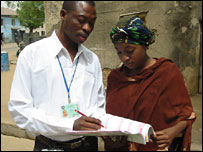
People must stay at home until they have filled in their form
|
The streets of Nigeria's main cities are quiet, as people have been told to stay at home and wait to be counted in the first census for 15 years.
The headcount is sensitive, as funding and political representation depend on the results but questions of religion and ethnicity have been left out.
There is frustration in many places that the process has started slowly.
Nigeria's president has stressed that the five-day census is not political and urged people to remain calm.
Nigeria is Africa's most populous country but estimates of its population range from 120 to 150 million.
The BBC's Alex Last in the commercial capital, Lagos, says the normally congested streets are eerily quiet, as enumerators go house-to-house counting residents.
BBC correspondents in other cities report a similar story, however some people are getting impatient, as they have not yet been visited by the census officials.
Some areas have also reported a lack of materials, while in the south-eastern city, Enugu, some officials refused to carry out the census because they had not been paid.
There is also some confusion as the first three days of the census have not been declared national public holidays, even though people have been urged to stay at home until they are counted.
The BBC's Alex Last in Lagos says the results will be scrutinised to see whether the majority of people live in the predominantly Muslim north or the Christian and animist south.
Although the controversial questions about ethnicity and religion have been removed, other key questions include:
- Education background
- Occupation
- Income
- Size of house
- Type of water supply
- Toilet facilities
- Type of fuel used
- Access to radio, television, telephone
Our correspondent says the logistical challenge of counting the population will be huge, but the results could prove even more problematic.
Nigeria's Civil Liberties Organisation has deployed some 42,000 people to monitor the enumerators and ensure everything is above board.
In Lagos, they began by going out in the early hours with police, counting the number of homeless.
'Lack of confidence'
The police have been instructed to prevent large-scale movements of people to stop individuals being counted in different areas.
"I wish to stress once again that census-taking is not politics and should therefore not be a contest for political supremacy," President Olusegun Obasanjo said in a national address.
 |
FACTS AND FIGURES
Almost 1m enumerators
42,000 monitors
1991 census: 88.9m people
People must stay at home to be counted
Questions on ethnicity and religion taken out
|
He said the exercise would benefit all Nigerians, by letting the government know how many people live in each area and plan services accordingly.
"In the past, there had been lack of public confidence in the census process to the extent that census taking had become a contest for inter-group supremacy," the president said.
He said that the latest technology, such as Geographical Positioning System (GPS) and satellite images, were being used to ensure the headcount was accurate.
Local media report that donkeys and camels are also being used to reach some of the more remote parts of the vast country.
Several people were killed in clashes related to the census over the weekend.
With previous counts mired in controversy and charges of fraud, there are only rough estimates for Nigeria's population - ranging from 120 million to 150 million.

